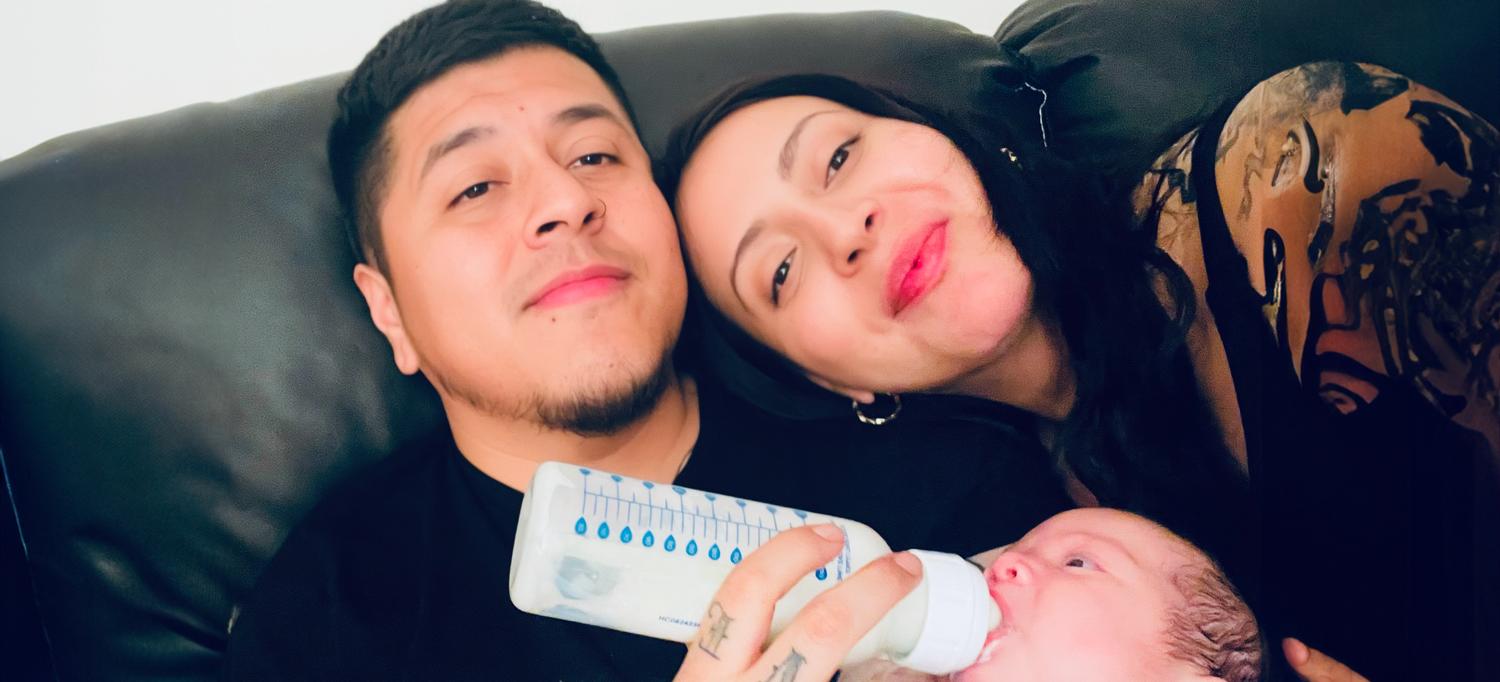
Nicolette Diaz with her partner, Luis, and baby girl, Leah. Diaz says her birthing experience with a midwife at NYU Langone was “the best.”
Courtesy of Nicolette Diaz
When Nicolette Diaz, 35, delivered her first child nine years ago at an understaffed New York City hospital, the experience was chaotic. She never had a chance to speak with the anesthesiologist or obstetrician, her epidural numbed only her right leg, and she was in extreme pain for 50 hours before finally giving birth to a baby girl, Claire. “It was very stressful,” recalls Diaz. “I didn’t feel I was treated with respect.”
Diaz, who lives in Jackson Heights, Queens, and is studying to become a pediatric therapist, became pregnant again last year. This time, she sought out a birthing experience “where my voice would be heard,” she says. Her search led her to select NYU Langone Health’s obstetrics and gynecology services and, ultimately, its midwifery services. When it was time for her to deliver, at Tisch Hospital on January 25, 2024, she met Aisha L. Olivacce, a certified nurse midwife (CNM), and was immediately struck by her gentle manner. “Her voice was soothing,” Diaz says. “She wasn’t commanding me. She was just giving me advice. It was exactly what I needed.”
When Diaz indicated she was in discomfort, Olivacce called in an anesthesiologist to administer an epidural. After a 13-hour labor and less than an hour of pushing, she gave birth to a healthy daughter, Leah. “My birthing experience was the best,” she says. “Aisha was by my side the whole time. I felt like I was with family.”
Midwifery, a centuries-old practice, is on the rise. About 12 percent of births in the United States are now attended by a midwife, according to the Government Accountability Office, and about 14,000 certified midwives are practicing nationwide, according to the American College of Nurse-Midwives. Clearly, a new generation of moms is attracted to a core belief among midwives that “pregnancy and childbirth are normal, healthy processes,” explains Eugenia Montesinos, CNM, inaugural director of midwifery services at Tisch Hospital. “Our bodies were made for that.”
Montesinos says the mission of her team is to provide holistic, evidence-based care for pregnant patients and improve outcomes. Indeed, a systematic review published in the journal BMC Pregnancy and Childbirth showed that midwife-led care contributes to a reduced rate of emergency cesarean deliveries.
At NYU Langone, women who are at low risk for complications can choose a midwife to create a birth plan, guiding them throughout pregnancy and delivery. A vast majority qualify for the services, including many women 35 or older. “Our midwives offer personalized care, emphasizing natural labor methods,” says Ashley S. Roman, MD, the Silverman Professor of Obstetrics and Gynecology and chief of obstetrics.
The team includes six midwives in Manhattan, all board-certified with graduate degrees in midwifery. Together, they provide 24/7 care. NYU Langone Hospital—Brooklyn has four midwives, led by Meleen Chuang, MD, chief of obstetrics and gynecology, and there are plans to expand to an around-the-clock care model there too. Midwives at NYU Langone also partner with obstetricians and maternal–fetal medicine specialists, who are fully integrated into every patient’s care.
Seeing a midwife at an academic medical center affords crucial safety benefits, notes Andrew F. Rubenstein, MD, director of the Generalist Division of the Department of Obstetrics and Gynecology at NYU Grossman School of Medicine. For example, a patient at a birthing center who experiences complications must be transferred quickly to a hospital. “By contrast, we have multidisciplinary care within an institution renowned for its safety and best outcomes,” says Dr. Rubenstein. Beyond their role in pregnancy and delivery, NYU Langone midwives provide gynecologic care from adolescence to menopause and beyond. “I can prescribe birth control pills, put you on an IUD, and recommend hormonal treatments at menopause,” says Montesinos. Midwives also make it a priority to be attuned to a patient’s mental health at every stage of their care. “I treat every patient like I’m the person in that chair or bed,” says Olivacce.
Diaz still chokes up when talking about her midwifery experience. “Aisha is amazing, and I’m grateful for the anesthesiologist who kept checking on me,” she says. “They love their jobs—you could tell—and really made me feel at ease.”

